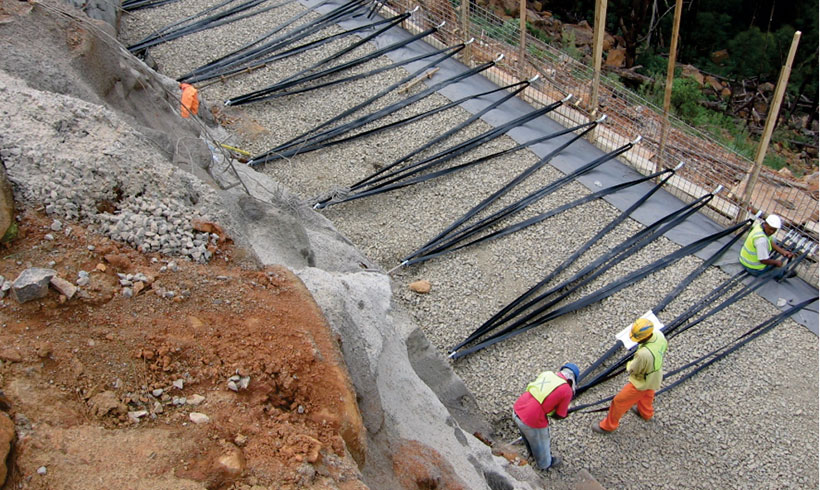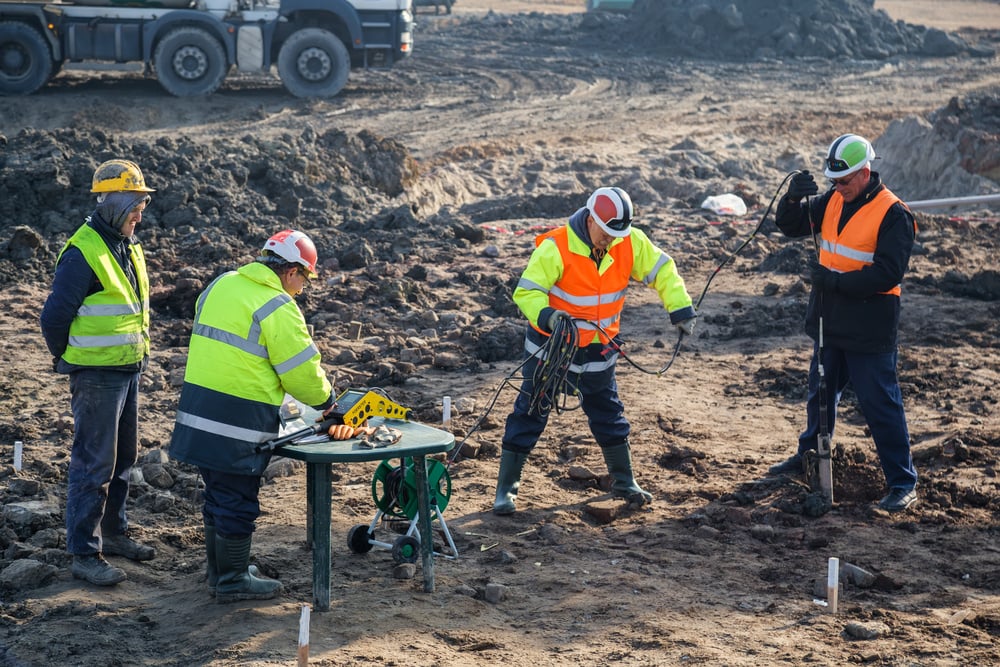How Specialized Geotechnical Engineering Solutions can Save You Time, Stress, and Money.
How Specialized Geotechnical Engineering Solutions can Save You Time, Stress, and Money.
Blog Article
Specialized Geotechnical Engineering Solutions - Questions
Table of Contents7 Easy Facts About Specialized Geotechnical Engineering Solutions ShownTop Guidelines Of Specialized Geotechnical Engineering SolutionsThe Only Guide for Specialized Geotechnical Engineering SolutionsSpecialized Geotechnical Engineering Solutions Fundamentals Explained
They conduct site investigations, collect samples, perform research laboratory examinations, and analyze data to evaluate the viability of the ground for building tasks. Based upon their searchings for, geotechnical engineers provide recommendations for structure design, slope security, preserving structures, and reduction of geotechnical risks. They work together with other specialists, such as architects, structural designers, and building and construction teams, to make sure that geotechnical considerations are integrated into the overall job style and execution.
Structure Design: Geotechnical engineers play an important function in developing foundations that can safely support the intended structure. They analyze the dirt conditions and load needs to figure out the proper structure type, such as superficial foundations (e.g., grounds), deep structures (e.g., piles), or specialized techniques like soil improvement. They consider elements such as negotiation limitations, bearing capacity, and soil-structure interaction to develop optimum structure layouts.
Some Known Questions About Specialized Geotechnical Engineering Solutions.
Below are some sorts of geotechnical engineers: Structure Engineer: Foundation designers concentrate on making and evaluating foundations for frameworks - Specialized Geotechnical Engineering Solutions. They examine the dirt problems, tons demands, and site characteristics to determine one of the most proper foundation type and layout, such as shallow foundations, deep structures, or specialized techniques like heap structures
They perform field testing, accumulate examples, and evaluate the collected information to characterize the dirt buildings, geologic developments, and groundwater conditions at a site. Geotechnical Instrumentation Engineer: Geotechnical instrumentation designers concentrate on monitoring and gauging the habits of soil, rock, and structures. They mount and maintain instrumentation systems that monitor aspects such as soil settlement, groundwater degrees, slope motions, and structural displacements to evaluate performance and supply early warnings of possible problems.
In the workplace environment, geotechnical designers use specialized software devices to perform computations, develop designs, and assess data. Specialized Geotechnical Engineering Solutions. They prepare reports, testimonial job requirements, communicate with customers and team members, and coordinate task activities. The workplace setup offers a favorable setting for research study, evaluation, and cooperation with other experts associated with the task
They often see project websites to perform website examinations, evaluate geotechnical problems, and collect information for evaluation. These check outs entail traveling to different areas, sometimes in remote or challenging terrains. Geotechnical designers might carry out soil sampling, conduct examinations, and screen building and construction activities to guarantee that the geotechnical facets of the task are being implemented appropriately.
An Unbiased View of Specialized Geotechnical Engineering Solutions
Geotechnical designers More hints additionally work in specialized geotechnical research laboratories. Geotechnical laboratory designers work thoroughly in these atmospheres, dealing with screening devices, operating tools, and recording data.
Keeping Wall surfaces: Developing wall surfaces that hold back dirt to stop landslides and provide security on sloped surfaces. Embankments and Earthworks: Designing embankments for roadways, trains, and dams to ensure they continue to be steady under stress. The mining market relies heavily on geotechnical engineering to ensure the safety and long life of its operations.
With this in mind, we have made our program to prepare pupils for success. The Geotechnical Engineering program at the University of Delaware offers possibilities for advanced research study and study in: Soil and rock technicians Soil-structure interaction Constitutive modeling Computational geomechanics Structure and planet structures design Ground enhancement Incline security and landslide stabilization Liquefaction of dirts and earthquake engineering Lab characterization of geomaterials and dirt reinforcement Ecological geotechnics Provided the solid demand for enhancement to our country's infrastructurethe American Society of Civil Engineers provided the united state
Geotechnical design is a branch of civil engineering; nevertheless, it includes making use of scientific techniques and concepts to accumulate and interpret the physical properties of the ground. Geotechnical engineers are associated with all phases of the layout of frameworks, from principle to construction. Their work is necessary in the layout and preparation procedure as they analyze the stability of soil, clay, silt, sand, and rock, prior to building and construction beginning.
6 Easy Facts About Specialized Geotechnical Engineering Solutions Shown
This is followed by a ground examination based on the searchings for of the workdesk research study and involves test matching and sampling to discover any kind of prospective concerns. Geotechnical engineers function within multidisciplinary groups, supported by intermediate and younger designers in addition to by CAD specialists. As a senior geotechnical designer on a hydro plant project, tasks might consist of taking part in technological evaluations (e.g., peer evaluations), tailings clog evaluations, dam security evaluations, and various other researches associated with the layout and building of mine waste centers.
While some specialists are experts entirely in geotechnics, others may function under titles like design rock hound or ground designer within similar capabilities. As a geotechnical engineer, you'll need to: build and preserve connections with customers and various other professionals associated with the site, throughout each projectmaintain safety and security requirements on site bear in mind expense ramifications when you make recommendationsstudy geological maps and aerial photographs from check out here a series of sources and from various time periodsexamine construction prepares to see exactly how feasible they are based on your understanding of the siteinvestigate dangers or geological risks for the sitesearch for eco delicate features, such as garbage dump beginning to develop factual and interpretive ground modelsplan area investigationsdrill and analyse samples of bedrock, dirt, groundwater and extra products monitor other experts on sitesolve technical problems as they occur, such as unforeseen structures at drill sitesmonitor problems during and after construction to see to it structures are stable in the brief and lengthy termadd information gathered on site to your preliminary researchcreate geotechnical estimations, illustrations, and two or three-dimensional computer versions translating the datamake suggestions about the proposed use the website.
There are great deals of opportunities to meet brand-new people, as you'll collaborate with a series of specialists at every site. The work can be difficult as you may be in charge of the safety and security of others while on website. There is also a high level of financial duty, as the suggestions you make can have serious price ramifications.

Report this page